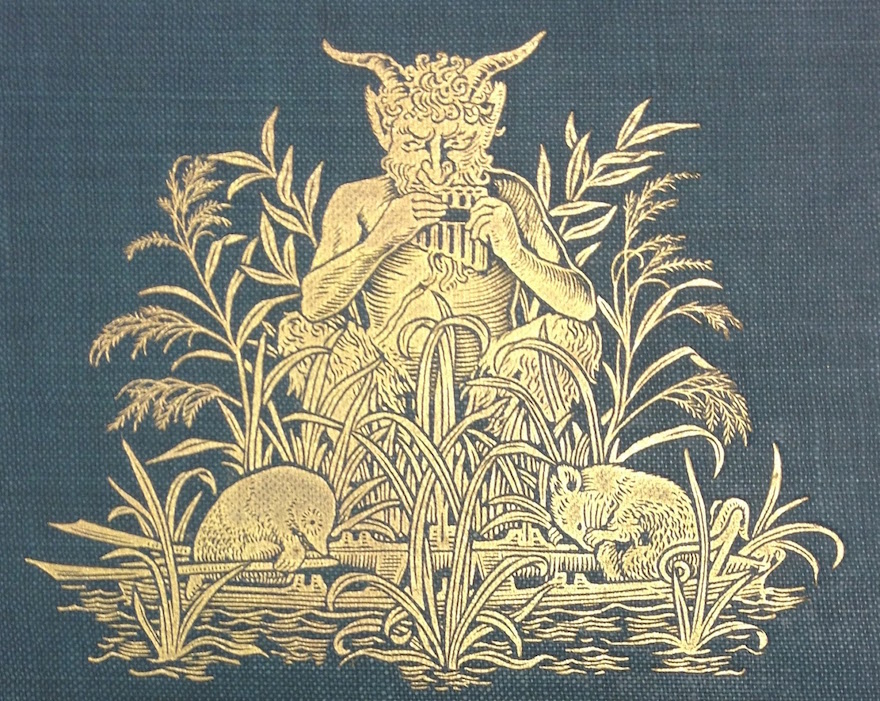Podcast (will-call): Play in new window | Download
Subscribe: RSS
We celebrate the Summer Solstice with one of the Summery-est
passages we know. Enjoy!

The Wind in the Willows
by Kenneth Grahame
(Full text available at Project Gutenberg)
VII. THE PIPER AT THE GATES OF DAWN
The Willow-Wren was twittering his thin little song, hidden himself in the dark selvedge of the river bank. Though it was past ten o’clock at night, the sky still clung to and retained some lingering skirts of light from the departed day; and the sullen heats of the torrid afternoon broke up and rolled away at the dispersing touch of the cool fingers of the short midsummer night. Mole lay stretched on the bank, still panting from the stress of the fierce day that had been cloudless from dawn to late sunset, and waited for his friend to return. He had been on the river with some companions, leaving the Water Rat free to keep a engagement of long standing with Otter; and he had come back to find the house dark and deserted, and no sign of Rat, who was doubtless keeping it up late with his old comrade. It was still too hot to think of staying indoors, so he lay on some cool dock-leaves, and thought over the past day and its doings, and how very good they all had been.

The Rat’s light footfall was presently heard approaching over the parched grass. “O, the blessed coolness!” he said, and sat down, gazing thoughtfully into the river, silent and pre-occupied.
“You stayed to supper, of course?” said the Mole presently.
“Simply had to,” said the Rat. “They wouldn’t hear of my going before. You know how kind they always are. And they made things as jolly for me as ever they could, right up to the moment I left. But I felt a brute all the time, as it was clear to me they were very unhappy, though they tried to hide it. Mole, I’m afraid they’re in trouble. Little Portly is missing again; and you know what a lot his father thinks of him, though he never says much about it.”
“What, that child?” said the Mole lightly. “Well, suppose he is; why worry about it? He’s always straying off and getting lost, and turning up again; he’s so adventurous. But no harm ever happens to him. Everybody hereabouts knows him and likes him, just as they do old Otter, and you may be sure some animal or other will come across him and bring him back again all right. Why, we’ve found him ourselves, miles from home, and quite self-possessed and cheerful!”
“Yes; but this time it’s more serious,” said the Rat gravely. “He’s been missing for some days now, and the Otters have hunted everywhere, high and low, without finding the slightest trace. And they’ve asked every animal, too, for miles around, and no one knows anything about him. Otter’s evidently more anxious than he’ll admit. I got out of him that young Portly hasn’t learnt to swim very well yet, and I can see he’s thinking of the weir. There’s a lot of water coming down still, considering the time of the year, and the place always had a fascination for the child. And then there are—well, traps and things—YOU know. Otter’s not the fellow to be nervous about any son of his before it’s time. And now he IS nervous. When I left, he came out with me—said he wanted some air, and talked about stretching his legs. But I could see it wasn’t that, so I drew him out and pumped him, and got it all from him at last. He was going to spend the night watching by the ford. You know the place where the old ford used to be, in by-gone days before they built the bridge?”
“I know it well,” said the Mole. “But why should Otter choose to watch there?”
“Well, it seems that it was there he gave Portly his first swimming-lesson,” continued the Rat. “From that shallow, gravelly spit near the bank. And it was there he used to teach him fishing, and there young Portly caught his first fish, of which he was so very proud. The child loved the spot, and Otter thinks that if he came wandering back from wherever he is—if he IS anywhere by this time, poor little chap—he might make for the ford he was so fond of; or if he came across it he’d remember it well, and stop there and play, perhaps. So Otter goes there every night and watches—on the chance, you know, just on the chance!”
Looking for a scholarly read on the role of Pan in The Wind in the Willows and literature in general? We recommend “A (Pagan) Wind in the Willows,” by Jason Mankey
They were silent for a time, both thinking of the same thing—the lonely, heart-sore animal, crouched by the ford, watching and waiting, the long night through—on the chance.
“Well, well,” said the Rat presently, “I suppose we ought to be thinking about turning in.” But he never offered to move.
“Rat,” said the Mole, “I simply can’t go and turn in, and go to sleep, and DO nothing, even though there doesn’t seem to be anything to be done. We’ll get the boat out, and paddle up stream. The moon will be up in an hour or so, and then we will search as well as we can—anyhow, it will be better than going to bed and doing NOTHING.”
“Just what I was thinking myself,” said the Rat. “It’s not the sort of night for bed anyhow; and daybreak is not so very far off, and then we may pick up some news of him from early risers as we go along.”
They got the boat out, and the Rat took the sculls, paddling with caution. Out in midstream, there was a clear, narrow track that faintly reflected the sky; but wherever shadows fell on the water from bank, bush, or tree, they were as solid to all appearance as the banks themselves, and the Mole had to steer with judgment accordingly. Dark and deserted as it was, the night was full of small noises, song and chatter and rustling, telling of the busy little population who were up and about, plying their trades and vocations through the night till sunshine should fall on them at last and send them off to their well-earned repose. The water’s own noises, too, were more apparent than by day, its gurglings and “cloops” more unexpected and near at hand; and constantly they started at what seemed a sudden clear call from an actual articulate voice.
The line of the horizon was clear and hard against the sky, and in one particular quarter it showed black against a silvery climbing phosphorescence that grew and grew. At last, over the rim of the waiting earth the moon lifted with slow majesty till it swung clear of the horizon and rode off, free of moorings; and once more they began to see surfaces—meadows wide-spread, and quiet gardens, and the river itself from bank to bank, all softly disclosed, all washed clean of mystery and terror, all radiant again as by day, but with a difference that was tremendous. Their old haunts greeted them again in other raiment, as if they had slipped away and put on this pure new apparel and come quietly back, smiling as they shyly waited to see if they would be recognised again under it.
Fastening their boat to a willow, the friends landed in this silent, silver kingdom, and patiently explored the hedges, the hollow trees, the runnels and their little culverts, the ditches and dry water-ways. Embarking again and crossing over, they worked their way up the stream in this manner, while the moon, serene and detached in a cloudless sky, did what she could, though so far off, to help them in their quest; till her hour came and she sank earthwards reluctantly, and left them, and mystery once more held field and river.
Then a change began slowly to declare itself. The horizon became clearer, field and tree came more into sight, and somehow with a different look; the mystery began to drop away from them. A bird piped suddenly, and was still; and a light breeze sprang up and set the reeds and bulrushes rustling. Rat, who was in the stern of the boat, while Mole sculled, sat up suddenly and listened with a passionate intentness. Mole, who with gentle strokes was just keeping the boat moving while he scanned the banks with care, looked at him with curiosity.
“It’s gone!” sighed the Rat, sinking back in his seat again. ‘so beautiful and strange and new. Since it was to end so soon, I almost wish I had never heard it. For it has roused a longing in me that is pain, and nothing seems worth while but just to hear that sound once more and go on listening to it for ever. No! There it is again!” he cried, alert once more. Entranced, he was silent for a long space, spellbound.
“Now it passes on and I begin to lose it,” he said presently. “O Mole! the beauty of it! The merry bubble and joy, the thin, clear, happy call of the distant piping! Such music I never dreamed of, and the call in it is stronger even than the music is sweet! Row on, Mole, row! For the music and the call must be for us.”
The Mole, greatly wondering, obeyed. “I hear nothing myself,” he said, “but the wind playing in the reeds and rushes and osiers.”
The Rat never answered, if indeed he heard. Rapt, transported, trembling, he was possessed in all his senses by this new divine thing that caught up his helpless soul and swung and dandled it, a powerless but happy infant in a strong sustaining grasp.
In silence Mole rowed steadily, and soon they came to a point where the river divided, a long backwater branching off to one side. With a slight movement of his head Rat, who had long dropped the rudder-lines, directed the rower to take the backwater. The creeping tide of light gained and gained, and now they could see the colour of the flowers that gemmed the water’s edge.
“Clearer and nearer still,” cried the Rat joyously. “Now you must surely hear it! Ah—at last—I see you do!”
Breathless and transfixed the Mole stopped rowing as the liquid run of that glad piping broke on him like a wave, caught him up, and possessed him utterly. He saw the tears on his comrade’s cheeks, and bowed his head and understood. For a space they hung there, brushed by the purple loose-strife that fringed the bank; then the clear imperious summons that marched hand-in-hand with the intoxicating melody imposed its will on Mole, and mechanically he bent to his oars again. And the light grew steadily stronger, but no birds sang as they were wont to do at the approach of dawn; and but for the heavenly music all was marvellously still.
On either side of them, as they glided onwards, the rich meadow-grass seemed that morning of a freshness and a greenness unsurpassable. Never had they noticed the roses so vivid, the willow-herb so riotous, the meadow-sweet so odorous and pervading. Then the murmur of the approaching weir began to hold the air, and they felt a consciousness that they were nearing the end, whatever it might be, that surely awaited their expedition.
A wide half-circle of foam and glinting lights and shining shoulders of green water, the great weir closed the backwater from bank to bank, troubled all the quiet surface with twirling eddies and floating foam-streaks, and deadened all other sounds with its solemn and soothing rumble. In midmost of the stream, embraced in the weir’s shimmering arm-spread, a small island lay anchored, fringed close with willow and silver birch and alder. Reserved, shy, but full of significance, it hid whatever it might hold behind a veil, keeping it till the hour should come, and, with the hour, those who were called and chosen.
Slowly, but with no doubt or hesitation whatever, and in something of a solemn expectancy, the two animals passed through the broken tumultuous water and moored their boat at the flowery margin of the island. In silence they landed, and pushed through the blossom and scented herbage and undergrowth that led up to the level ground, till they stood on a little lawn of a marvellous green, set round with Nature’s own orchard-trees—crab-apple, wild cherry, and sloe.
“This is the place of my song-dream, the place the music played to me,” whispered the Rat, as if in a trance. “Here, in this holy place, here if anywhere, surely we shall find Him!”
Then suddenly the Mole felt a great Awe fall upon him, an awe that turned his muscles to water, bowed his head, and rooted his feet to the ground. It was no panic terror—indeed he felt wonderfully at peace and happy—but it was an awe that smote and held him and, without seeing, he knew it could only mean that some august Presence was very, very near. With difficulty he turned to look for his friend and saw him at his side cowed, stricken, and trembling violently. And still there was utter silence in the populous bird-haunted branches around them; and still the light grew and grew.
Perhaps he would never have dared to raise his eyes, but that, though the piping was now hushed, the call and the summons seemed still dominant and imperious. He might not refuse, were Death himself waiting to strike him instantly, once he had looked with mortal eye on things rightly kept hidden. Trembling he obeyed, and raised his humble head; and then, in that utter clearness of the imminent dawn, while Nature, flushed with fullness of incredible colour, seemed to hold her breath for the event, he looked in the very eyes of the Friend and Helper; saw the backward sweep of the curved horns, gleaming in the growing daylight; saw the stern, hooked nose between the kindly eyes that were looking down on them humourously, while the bearded mouth broke into a half-smile at the corners; saw the rippling muscles on the arm that lay across the broad chest, the long supple hand still holding the pan-pipes only just fallen away from the parted lips; saw the splendid curves of the shaggy limbs disposed in majestic ease on the sward; saw, last of all, nestling between his very hooves, sleeping soundly in entire peace and contentment, the little, round, podgy, childish form of the baby otter. All this he saw, for one moment breathless and intense, vivid on the morning sky; and still, as he looked, he lived; and still, as he lived, he wondered.
“Rat!” he found breath to whisper, shaking. “Are you afraid?”
“Afraid?” murmured the Rat, his eyes shining with unutterable love. “Afraid! Of HIM? O, never, never! And yet—and yet—O, Mole, I am afraid!”
Then the two animals, crouching to the earth, bowed their heads and did worship.
Sudden and magnificent, the sun’s broad golden disc showed itself over the horizon facing them; and the first rays, shooting across the level water-meadows, took the animals full in the eyes and dazzled them. When they were able to look once more, the Vision had vanished, and the air was full of the carol of birds that hailed the dawn.
As they stared blankly in dumb misery deepening as they slowly realised all they had seen and all they had lost, a capricious little breeze, dancing up from the surface of the water, tossed the aspens, shook the dewy roses and blew lightly and caressingly in their faces; and with its soft touch came instant oblivion. For this is the last best gift that the kindly demi-god is careful to bestow on those to whom he has revealed himself in their helping: the gift of forgetfulness. Lest the awful remembrance should remain and grow, and overshadow mirth and pleasure, and the great haunting memory should spoil all the after-lives of little animals helped out of difficulties, in order that they should be happy and lighthearted as before.
Mole rubbed his eyes and stared at Rat, who was looking about him in a puzzled sort of way. “I beg your pardon; what did you say, Rat?” he asked.
“I think I was only remarking,” said Rat slowly, “that this was the right sort of place, and that here, if anywhere, we should find him. And look! Why, there he is, the little fellow!” And with a cry of delight he ran towards the slumbering Portly.
But Mole stood still a moment, held in thought. As one wakened suddenly from a beautiful dream, who struggles to recall it, and can re-capture nothing but a dim sense of the beauty of it, the beauty! Till that, too, fades away in its turn, and the dreamer bitterly accepts the hard, cold waking and all its penalties; so Mole, after struggling with his memory for a brief space, shook his head sadly and followed the Rat.
Portly woke up with a joyous squeak, and wriggled with pleasure at the sight of his father’s friends, who had played with him so often in past days. In a moment, however, his face grew blank, and he fell to hunting round in a circle with pleading whine. As a child that has fallen happily asleep in its nurse’s arms, and wakes to find itself alone and laid in a strange place, and searches corners and cupboards, and runs from room to room, despair growing silently in its heart, even so Portly searched the island and searched, dogged and unwearying, till at last the black moment came for giving it up, and sitting down and crying bitterly.
The Mole ran quickly to comfort the little animal; but Rat, lingering, looked long and doubtfully at certain hoof-marks deep in the sward.
“Some—great—animal—has been here,” he murmured slowly and thoughtfully; and stood musing, musing; his mind strangely stirred.
“Come along, Rat!” called the Mole. “Think of poor Otter, waiting up there by the ford!”
Portly had soon been comforted by the promise of a treat—a jaunt on the river in Mr. Rat’s real boat; and the two animals conducted him to the water’s side, placed him securely between them in the bottom of the boat, and paddled off down the backwater. The sun was fully up by now, and hot on them, birds sang lustily and without restraint, and flowers smiled and nodded from either bank, but somehow—so thought the animals—with less of richness and blaze of colour than they seemed to remember seeing quite recently somewhere—they wondered where.
The main river reached again, they turned the boat’s head upstream, towards the point where they knew their friend was keeping his lonely vigil. As they drew near the familiar ford, the Mole took the boat in to the bank, and they lifted Portly out and set him on his legs on the tow-path, gave him his marching orders and a friendly farewell pat on the back, and shoved out into mid-stream. They watched the little animal as he waddled along the path contentedly and with importance; watched him till they saw his muzzle suddenly lift and his waddle break into a clumsy amble as he quickened his pace with shrill whines and wriggles of recognition. Looking up the river, they could see Otter start up, tense and rigid, from out of the shallows where he crouched in dumb patience, and could hear his amazed and joyous bark as he bounded up through the osiers on to the path. Then the Mole, with a strong pull on one oar, swung the boat round and let the full stream bear them down again whither it would, their quest now happily ended.
“I feel strangely tired, Rat,” said the Mole, leaning wearily over his oars as the boat drifted. “It’s being up all night, you’ll say, perhaps; but that’s nothing. We do as much half the nights of the week, at this time of the year. No; I feel as if I had been through something very exciting and rather terrible, and it was just over; and yet nothing particular has happened.”
“Or something very surprising and splendid and beautiful,” murmured the Rat, leaning back and closing his eyes. “I feel just as you do, Mole; simply dead tired, though not body tired. It’s lucky we’ve got the stream with us, to take us home. Isn’t it jolly to feel the sun again, soaking into one’s bones! And hark to the wind playing in the reeds!”
“It’s like music—far away music,” said the Mole nodding drowsily.
“So I was thinking,” murmured the Rat, dreamful and languid. “Dance-music—the lilting sort that runs on without a stop—but with words in it, too—it passes into words and out of them again—I catch them at intervals—then it is dance-music once more, and then nothing but the reeds” soft thin whispering.”
“You hear better than I,” said the Mole sadly. “I cannot catch the words.”
“Let me try and give you them,” said the Rat softly, his eyes still closed. “Now it is turning into words again—faint but clear—Lest the awe should dwell—And turn your frolic to fret—You shall look on my power at the helping hour—But then you shall forget! Now the reeds take it up—forget, forget, they sigh, and it dies away in a rustle and a whisper. Then the voice returns—
“Lest limbs be reddened and rent—I spring the trap that is set—As I loose the snare you may glimpse me there—For surely you shall forget! Row nearer, Mole, nearer to the reeds! It is hard to catch, and grows each minute fainter.
“Helper and healer, I cheer—Small waifs in the woodland wet—Strays I find in it, wounds I bind in it—Bidding them all forget! Nearer, Mole, nearer! No, it is no good; the song has died away into reed-talk.”
“But what do the words mean?” asked the wondering Mole.
“That I do not know,” said the Rat simply. “I passed them on to you as they reached me. Ah! now they return again, and this time full and clear! This time, at last, it is the real, the unmistakable thing, simple—passionate—perfect——”
“Well, let’s have it, then,” said the Mole, after he had waited patiently for a few minutes, half-dozing in the hot sun.
But no answer came. He looked, and understood the silence. With a smile of much happiness on his face, and something of a listening look still lingering there, the weary Rat was fast asleep.
Music accompanying our Summer Solstice presentation
String Quartet No. 6 in B Flat Major, Op. 18, No. 6 – IV. (Adagio) La Malinconia, by Ludwig Van Beethoven (Public Domian, made available by MUSOPEN)
Concerto for Flute, Harp, and Orchestra in C major, K. 299, by Wolfgang Amadeus Mozart, played by Alexander Murray, flute and Ann Yeung, harp, with the Sinfonia da Camera of the University of Illinois, Ian Hobson, music director. (EFF OAL, made available by ibiblio.)
Nocturne in D-flat Major Op. 27, No.2, by Frédéric Chopin, (Public Domain, made available by the Set Chopin Free Project

















You must be logged in to post a comment.